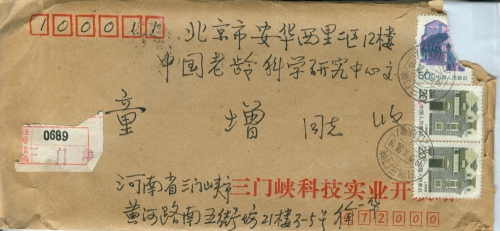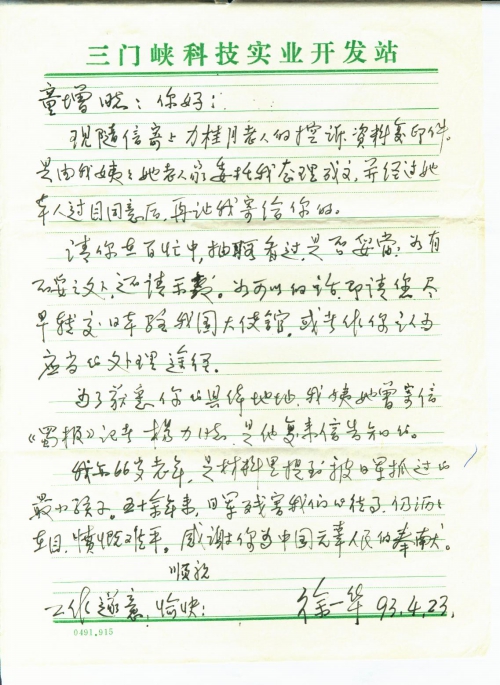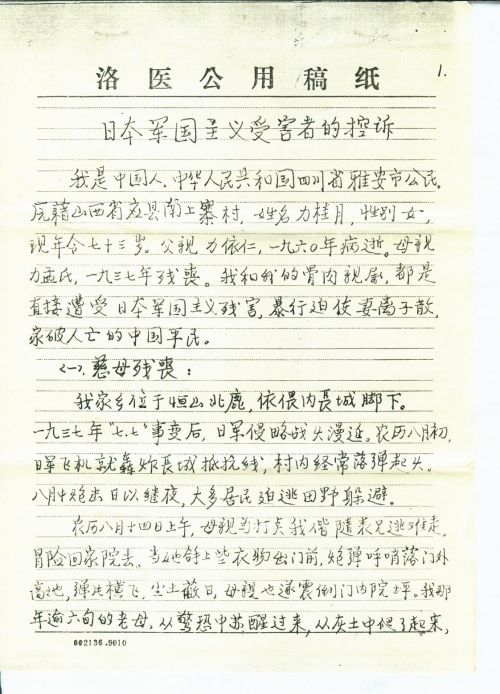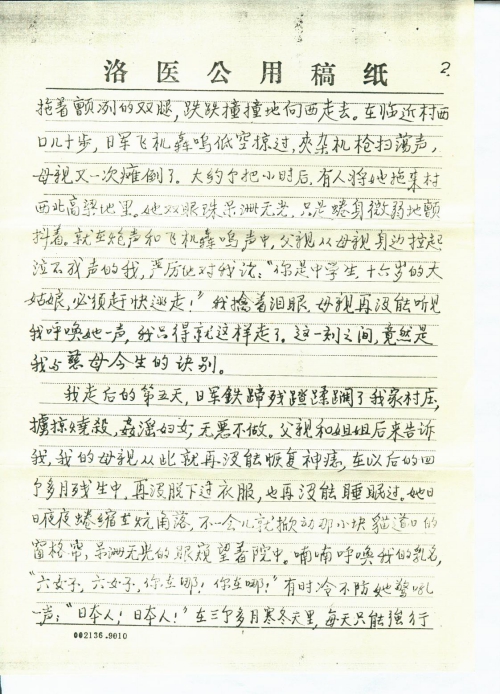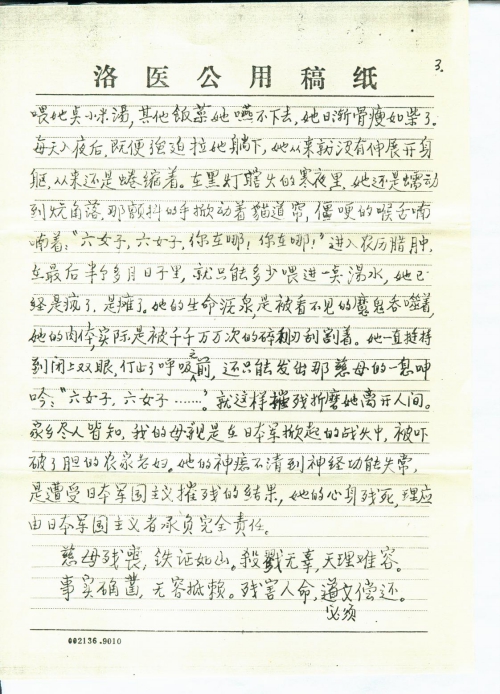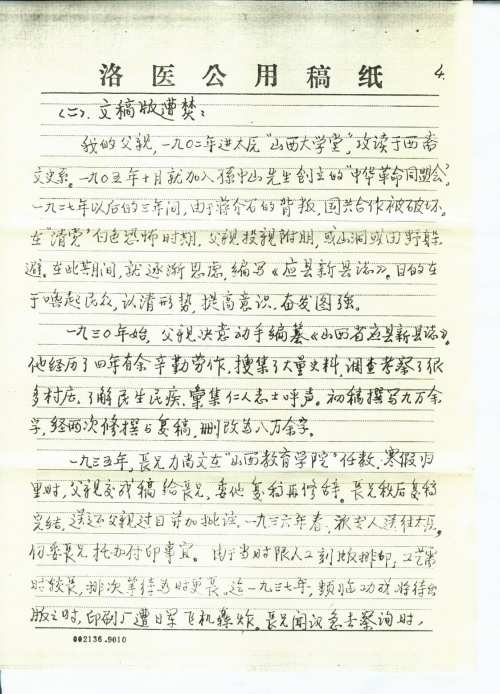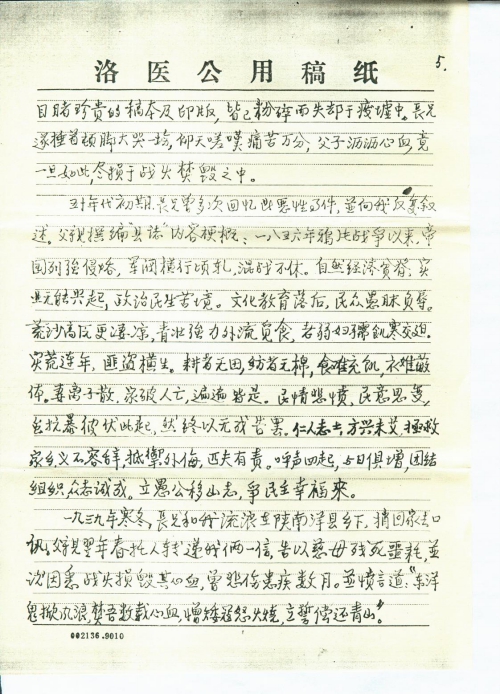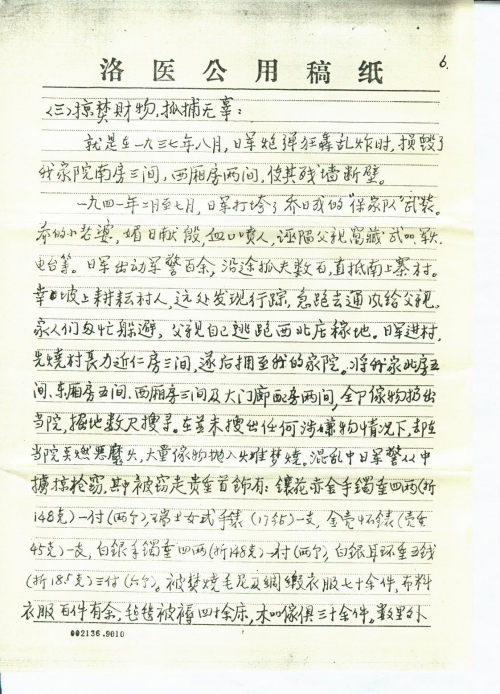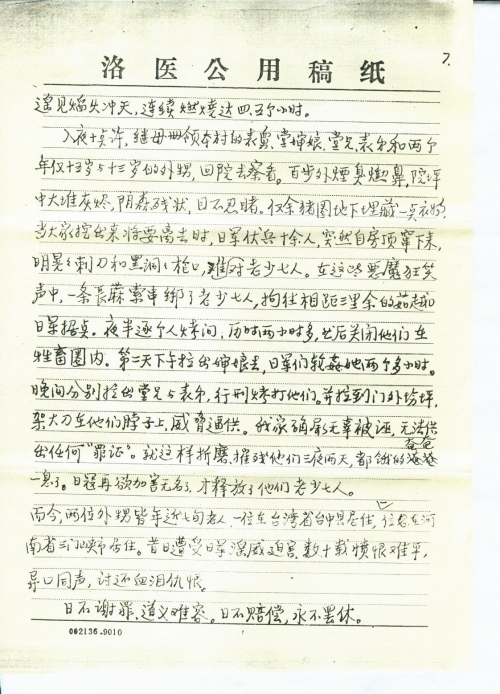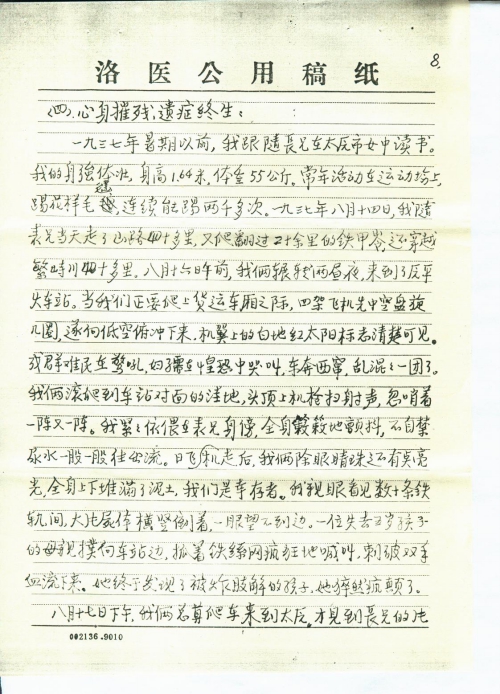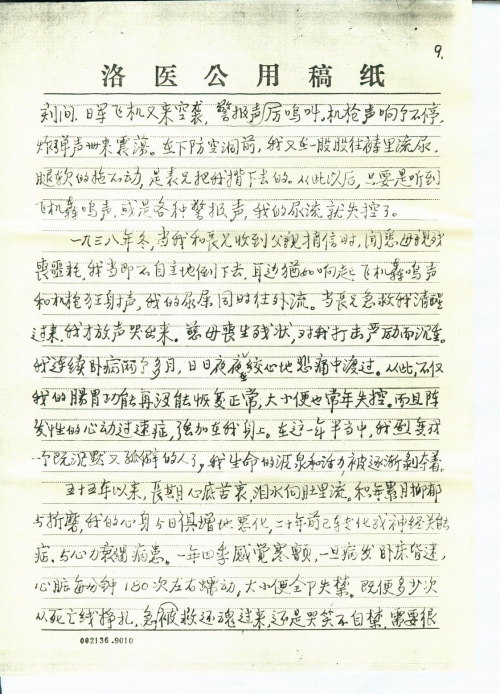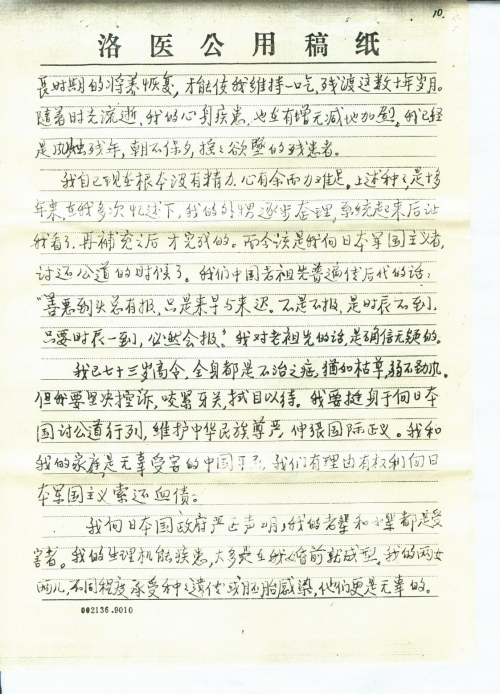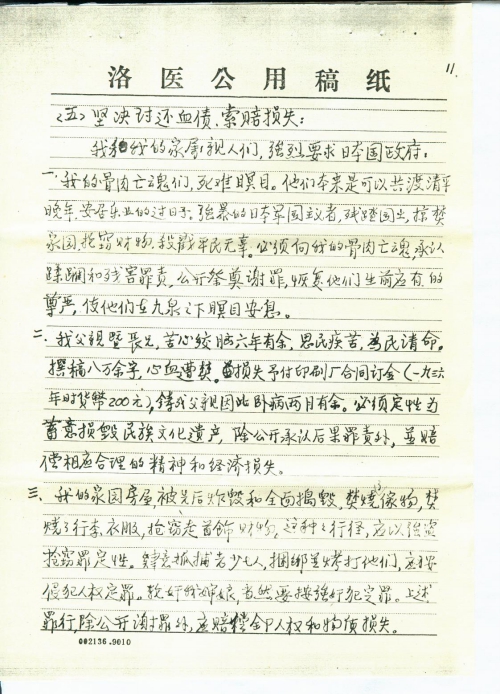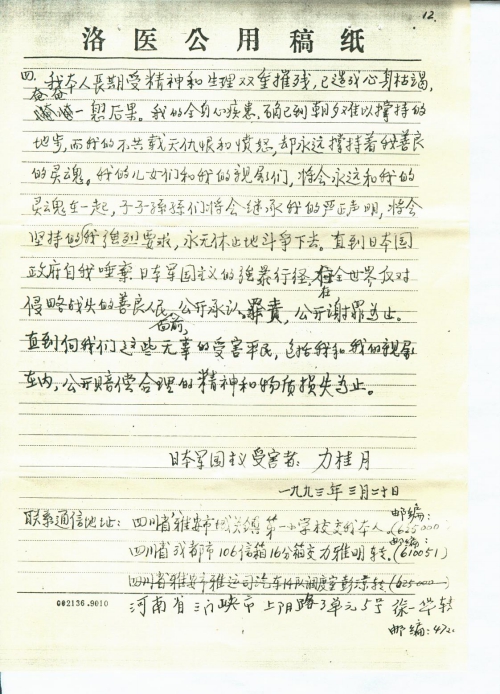Date of letter:1993-03-20
Address of author:Sanmenxia City, Henan Province
Date of event:1937-1941
Location of event:Shanxi Province
Name of author:Li Guiyue
Name(s) of victim(s):Li Guiyue and her family member
Type of atrocity:Air Bombings, Rapes, Others(AB, RA, OT)
Other details:On August 14, 1937, the Japanese Army bombed Ying County in Shanxi Province. Afterwards the Japanese Army burned, killed and looted in our village, raped women, committed all sorts of crimes. My mother also became mentally unbalanced, my elder brother Li Shagnwen’s manuscript was destroyed by the Japanese Army in bombing in 1937. In August of the same year, my family’s houses were destroyed in bombing by the Japanese Army. In 1938, I met bombing by the Japanese Army which made me disabled. In 1941 the Japanese Army captured many people of my family and tortured them, and they also raped my aunt.
Comrade Tong Zeng:
Hello!
I hereby enclose a copy of the complaints from my aging aunt, Li Guiyue. My aunt entrusted me to organize them into this article, and gave me her personal approval to mail it to you.
Could you please find time to examine it to see if it is appropriate? If you find anything improper, please let me know. If possible, please forward it to the Japanese Embassy in China as soon as possible, or through any other appropriate channels that you see fit.
In order to obtain your exact address, my aunt wrote a letter to Comrade Yang Li, a journalist with “Shu Bao”, and he gave her your address.
I am now 66 years old, but I was the youngest among children who were captured by the Japanese Army as mentioned in the article. Over the past fifty odd years, the persecutions by the Japanese Army in the past have lived vividly in my memory and have continued to cause me to seethe with anger. Thank you for your devotion to help the innocent Chinese people.
Wishing you
Success in your work and great happiness!
Xu Yihua
93.4.23
Denouncement of the Japanese Militarism by the Victims
I am a Chinese, a citizen of Ya An city, Sichuan Province, People’s Republic of China, originally from Nanshangzai Village, Ying County, Shanxi Province. My name is Li Guiyue, female, now aged 73. My father is Li Yiren; he passed away in 1960 due to illness. My mother is Ms Li, nee Meng, died of disability in 1937. My family members and I are all Chinese citizens who suffered direct persecution from the Japanese Militarism, whose atrocities brought us lost spouses, separated children, and broken families.
(I) Disability and death of mother:
My hometown is located in the north side of Hengshan Mountain, nestled at the foot of the Inner Great Wall.
After the “July 7″ incident in 1937, the war flames of the Japanese military invasion spread. In early August on the lunar calendar, the Japanese military aircrafts bombarded the Great Wall resistance line; shells often landed in the villages and caused fire. Around mid August, mortar bombardments continued day and night; so most residents were forced to flee and hide in the fields.
In the morning of August 14 on the lunar calendar, in order to make preparations for my escape, together with my cousin, my mother took the risk of returning home. When she was preparing to leave after picking up some clothing, a bomb whizzed by and landed on the highland just outside the door; shell scraps splashed, dust and dirt blocked out the sun, and my mother collapsed on the yard inside the gate due to shock waves. My over the 60 mother woke up from the terror, stood up from the dust pile, and, with wobbly steps, she stumbled toward the west. Several dozen steps away from the west end of the village, the Japanese military aircrafts made low passovers accompanied by shooting machine guns; and my mother collapsed on the ground. After about one hour or so, someone dragged her into the sorghum field in the northwest of the village. Her eyes were glazed and lifeless, and her curled body trembled weakly. Amid exploding bombs and roaring aircrafts, my father dragged me, who was crying copiously, up from my mother’s side, and told me harshly:”You are a high school student, a 16 year old girl, you must escape quickly!” With tears in my eyes, I simply left; and my mother would not hear me calling her again. It did not occur to me that this moment was the last time I would see my mother.
On the fifth day after I left, the Japanese Army’s iron heels trampled and ravaged my home village. They looted, burned, abducted, killed, raped women, and committed all kinds of crimes. My father and my elder sister later told me that my mother never regained her sound mind since. In the subsequent four months plus of her remaining life, she never undressed, nor slept. Day and night, she crouched in a corner of the kang (bed stove). All the time she would flutter the small curtain at the cat entrance. She would peer at the courtyard with her glazed eyes and mutter my childhood name, “Sixth daughter, sixth daughter, where are you! Where are you!” Sometimes she would unexpectedly roar aloud:”Japanese! Japanese!” During the three plus months of wintry days, each day we could only feed her some millet soup for she was unable to swallow other food. Day by day, she gradually became emaciated. Every night, even after we forced her to lie down, she would never stretch her body, always curled up. Even in the dark cold nights, she would still wiggle her way to the corner of the kang, her trembling hands would flutter the curtain, her crusted throat would murmur:”Sixth daughter, sixth daughter, where are you! Where are you!” In December of the lunar calendar, the last half month or so of her life, she could only drink a little soup for she was already out of her mind and paralyzed. Her source of life was nibbled away by an invisible demon; her physical body was like being cut by a sharp knife millions of times. She remained this way until she closed her eyes forever. Before she stopped breathing, she was still muttering the faint motherly moan:”Sixth daughter, sixth daughter……” In this tormented way, she left this world. Everyone in my hometown knew that my mother, a frightened woman farmer, was the victim of persecution -in a war waged by the Japanese military. From her confused mind to her neurological disorders, the Japanese Militarists should assume the full responsibility of the disability and death of both her body and mind.
Mother’s disability and death are iron-clad evidence of crime.
Killing innocent people, heaven cannot tolerate.
Irrefutable facts cannot be denied.
Destroyed lives must be compensated.
(II) Burned Manuscript:
In 1920, my father, who was enrolled in Taiyuan “Shanxi Academy” studied at the Department of Literature and History in Xizhai. He joined the “Revolutionary United League of China” founded by Mr. Sun Yat-sen in October 1905. In the three years after 1927, due to betrayal of Chiang Kai-shek, the cooperation between Kuomintang and the Communist Party of China was destroyed. During the “Party Purge” white terror period, my father either sheltered with relatives and friends, or hid in mountain caves or the fields. During this period, he gradually developed the idea of compiling “Ying County New County Annals”, aiming to arouse the public to recognize the situation, improve awareness, and work hard for future prosperity.
In 1930, my father made up his mind to compile “Shanxi Province Ying County New County Annals”. He worked diligently for more than four years, collected a massive amount of historical information, surveyed and inspected many villages, learned about people’s livelihood and hardships, and assembled the voices of people with good ideas. The first draft contained over 90,000 words. After two amendments and revisions, it was abridged to over 80,000 words.
In 1935, my elder brother, Li Shangwen, was a lecturer at the “Shanxi Education College.” During the winter vacation when he returned to hometown, my father handed the manuscript to my elder brother and asked him to review and polish the manuscript. My elder brother finished the job after the autumn of that year and returned it to my father for examination and addition of notes. In the spring of 1936, he dispatched someone to deliver it to Taiyuan and entrusted my elder brother to handle the printing issues. Because the typesetting was done manually at that time, it took a long time to do typesetting; but the waiting for his turn took even longer time. In 1937, when the typesetting was finally finished and publication was imminent, the publishing house was bombed by the Japanese military aircrafts. When my elder brother heard the news and rushed there to make inquiries, he personally witnessed the precious manuscript and the printing plates were all destroyed and lost in the debris. My elder brother burst into tears on the spot; punching his head and stomping his feet, he looked up to heaven and sighed in deep anguish. The painstaking work of both father and son was lost abruptly in the war.
In the early 1950’s, my elder brother recalled this vicious incident many times, and told me the story again and again. Here is an outline of the “County Annals” compiled by my father: Since the Opium War in 1856, the imperialist countries invaded and occupied our land; warlords fought each other for dominance; war never ended. Natural resources were meager; industry remained weak and incompetent; people lived in dire conditions; cultural education was lacking; the public was kept in ignorance and humiliation; desert plateaus were even bleaker; young laborers went out of town to find jobs; the old, the weak, women, and children suffered from hunger and cold. Famine lasted for consecutive years; bandits were rife; farmers had no land; weavers had no cotton; food could not alleviate hunger; clothing could not cover the body; wives were lost and children went missing; families were broken up; such cases were numerous to see. The public simmered in anger and thirsted for a change. Yet despite frequent violent resistance, the final outcome was not successful. People with integrity are emerging to save the homeland; everyone is responsible to resist foreign invasion; calls to rise up are heard everywhere; unity gives strength; foster the ambition of Old Man Yu, (an old man who was determined to move a mountain one shovel at a time); strive for a democratic happy future.
In the winter of 1939, my elder brother and I lived in the countryside of Yang County in South Shaanxi. We asked some townsfolk to send oral messages back home. In the spring of the following year, my father sent us a letter, which informed us of the death of our mother. He also said that, because of the war, his painstaking work was destroyed and he felt very sad and fell ill for several months. He said angrily:”The Japanese invaders destroyed my work of several years; I vow to make them repay the debt.”
(III) Looting & burning properties, detaining innocent civilians:
It was in August, 1937, the Japanese Army fired mortar rounds randomly and destroyed three rooms in the southern house of our home, two rooms of the western wing house, leaving behind ruins and broken walls.
From February to July, 1941, the Japanese Army defeated Qiao Richeng’s “Home Protection Squad” armed force. In order to gain favor with the Japanese, Qiao’s concubine made slanderous charges and accused my father of hiding weapons, ammunition, radio, etc. The Japanese Army dispatched over 100 military policemen, grabbed several hundred laborers along the way, and marched directly to the Nanshangzai Village. Fortunately, farmers working on the slopes discovered the Japanese movement and ran in a hurry to tip off my father. Family members quickly fled; my father himself ran to the crop field in the northwest. After the Japanese Army entered the village, they first burned three houses of the Village Chief, Li Jinren, then they swarmed to my home compound, threw out everything in the five rooms of the northern house, five rooms in the east wing, three rooms in the west wing, and two off-corridor side rooms, and dug several feet deep to look for ammunition. When they failed to find anything suspicious, they set a fire in the yard and threw all household articles into the fire. In the chaos, the Japanese Army and police looted the houses and stole precious jewelry items including: one pair (two piece) of inlaid gold bracelet weighing four liang (equivalent to 148 g), one Swiss lady’ watch (17 carat), one gold cover pocket watch (the cover weighed 45 g), one pair (two pieces) of silver bracelet weighing four liang (equivalent to 148 g), three pairs (six pieces) of silver earring weighing five qian (equivalent to 18.5 g). The destroyed articles included over 70 woolen and silk garments, over 100 cloth garments, 40 plus blankets and quilts, more than 30 items of wooden furniture. The fire burned for four to five hours continually, and could be seen several li away.
At around 10 o’clock in the night, my step mother led uncle, aunt, elder cousin, younger cousin, and two 15-year old and 13-year old nephews of the same village to return home and take a look. The smell of things burning assailed their noses even several hundred steps away. Inside the yard they found big piles of ash, which formed a horrible sight. We had some clothing and other things hidden and buried in the ground under the pigsty. When they dug them up and ready to leave, suddenly over a dozen Japanese soldiers waiting in ambush jumped down from the roof; shinny bayonets and intimidating rifle nozzles were aimed at the seven persons, old and young alike. Amid the guffaws of these devils, they used one rope to tie them in a string and escorted them to Ruyuekou, the Japanese Army stronghold about 3 li away. At midnight, they interrogated them one by one, which lasted more than two hours, then imprisoned them in the cattle pen. In the afternoon of the second day, the Japanese soldiers singled out my aunt and they gang raped her for over two hours. In the evening they singled out elder cousin and younger cousin, one at a time, and tortured them. And then the Japanese soldiers dragged them out onto the field, with swords on their necks, threatened and forced them to make confessions. Since my family was really innocent, there was no way to supply any “criminal evidence”. In this way, they were tormented and ravaged for three nights and two days; everyone was starved to near death. The Japanese invaders could not find any charges against them so they released the seven persons.
Today, the two nephews were all near seventy years old, one lived in Taichung, Taiwan, another lived in Sanmenxia City, Henan Province. Several dozen years on, their angers caused by the persecution of the Japanese Army have not been mollified; they unanimously demand compensation for the horrible experience which is stained with blood and tear.
No apology from the Japanese means no justice. No compensation from the Japanese means no peace.
(IV) Mental and physical persecution, lifelong disability:
Before the summer vacation in 1937, I followed my elder brother and studied at Taiyuan Girls High School. I was 1.64 meters tall, 55 kg in weight, and physically strong. I frequently played on the sports grounds. I could kick a shuttlecock continuously over 2000 times. On August 14, 1937, I followed my cousin and walked 40 li of mountain road, climbed 20 li long Tiejialing, and crossed 10 li of Fanshichuan. In the morning of August 16, after two days and two nights of walking, we finally came to Yuanping Railway Station. Just when we were planning to climb onto a freight car, four aircrafts first circled in the air, then dived low, the red suns on white background painted on the aircraft wings were clearly visible. Crowds of refugees screamed in panic; women and children cried in terror; they darted here and there; the scene was a mess. We rolled onto the lowland opposite the railway station. Wave after wave machine gun clattered overhead. I crouched closely beside my cousin; I shivered all over and was so scared that I wetted myself repeatedly. After the Japanese aircrafts left, except for the whites of our eyes, we were completely covered with dust and dirt. Fortunately, we were survivors. I personally witnessed that, between several dozen railway tracks, innumerable number of bodies scattered all over the ground, stretching to as far as eyes could see. One mother who lost a five-year old child stumbled toward the railway station; she grabbed the wire mesh and shouted hysterically. Blood trickled down as her hands were pierced by the barbed wire. She finally discovered her child, whose body had already been disintegrated by the explosions. At that moment, she went insane.
In the afternoon of August 17, we finally reached Taiyuan by climbing onto a railway carriage. Immediately after we met my elder brother, the Japanese military aircrafts again started air raid; the siren shrieked; machine guns clattered non-stop; bomb explosions shook the ground. Before going down the air raid shelter, I again found myself incontinent; my legs were unable to move; it was my cousin who carried me down. Since then, whenever I hear booming sound of aircrafts, or the shrieking sound of any kind of siren, I would lose control and involuntarily urinate.
In the winter of 1938, when my elder brother and I received a letter from my father and learned the news of my mother’s death, I immediately collapsed and fell to the ground; as if hearing booming of aircrafts and bursts of machine gun, I also lost continence. When my elder brother applied first-aid measures to help me regain consciousness, only then did I cried out. My mother’s disability and death dealt a heavy blow to me. I was bed ridden for over two months and spent days and nights in heart-rending pain. Since then, my intestine and stomach functions never recovered; I also lost control of my relief functions throughout the years. Meanwhile I also developed paroxysmal tachycardia. In the one and half year’s time, I dramatically became a silent and eccentric person; the source and vitality of my life were gradually being stripped away.
Over the past 55 years, enduring anger was pent up in my heart; tears of misery were swallowed down. Owing to long-term depression and torment, my physical and mental conditions deteriorated with the passage of time. Twenty years ago, they had evolved into neurosis and heart failure illnesses. Regardless of the four seasons, I feel cold. When the illness attacked I would fall into a coma; heart beat goes to 180 times per minute; both urination and defection become incontinent. Several times I was saved from the brink of death and regained consciousness later. I would lose control of myself and it would take a long time for me to recover, to keep breathing. I have lived this way for dozens of years. As time passed, my illness also worsened. I am already near the end of my life and may expire any day, any time. I am a disabled person on the edge of collapse.
Now I have no energy; the mind is willing but the body is weak. The above text is the result of my recollection over the past ten years and sorted out by my nephew. I further supplemented details after reading the initial draft. Now the moment to demand justice from the Japanese Militarists has finally come. We Chinese have a saying, which is handed down from generation to generation: “Good is rewarded with good, evil is rewarded with evil; it is just a matter of time.” I am convinced about its authenticity.
I’m already 73 and full of incurable illnesses. I am too weak to stand in the wind, just like a blade of withered grass. Nevertheless, I still want to firmly lodge my complaints. With clenched teeth, I wait expectantly for the outcome. I want to join the ranks to demand compensation from Japan, to safeguard the dignity of the Chinese people, and to uphold international justice. I and my family are innocent Chinese civilian victims; we are fully justified to demand repayment of the debt of blood from the Japanese military aggressors.
I solemnly declare to the Japanese government, my parent and child generations are all victims. My physiological illness due to the Japanese atrocity took shape before marriage. My two daughters and two sons, to different degrees, inherited altered genetics or developed embryonic diseases. They are innocent.
(V) Firmly demand payment for debts of blood and compensation for losses:
I, my family members, and relatives, strongly demand Japanese government to do the following:
I. The souls of my endeared ones are not resting in peace. They originally could have spent their old age in peace and happiness. However, the barbaric Japanese Militarists trampled our land, burned our homes, looted properties, and killed innocent civilians. They must apologize to the souls of my endeared ones, acknowledge their ravage and persecution crimes, openly apologize and hold memorial ceremonies so as to restore the dignities of the victims that they deserved before death and allow them to rest in peace in afterlife.
II. My father and my elder brother cudgeled their brains for more than six years and compiled a manuscript of over 80,000 words to reflect and publicize the hardship of the common people. But the manuscript of their painstaking efforts was destroyed. The losses include contract deposit to the printing factory (200 yuan 1936) and my father’s illness for more than two months. It must be classified as deliberate destruction of cultural heritage. Apart from public apology, it is necessary for the Japanese government to provide commensurate and reasonable compensations to all their mental and economic losses.
III. My home and houses were bombed and completely destroyed; everything, including furniture luggage and clothing, was burned; and jewelries and valuables were looted. Such felonious behaviors must be punished. The arbitrary capturing of seven people, tied up and tortured, must be punished as violation of human rights. My aunt was gang raped and those involved must be punished as rapists. For the above crimes, apart from public apology, it is necessary for Japan to compensate all human rights and material losses.
IV. I myself suffered mental and physiological ravage for many years. As a result, I already feel exhausted mentally and physically, and on the brink of death. My illnesses cover my whole body and mind and have indeed progressed to the extent that it is difficult to sustain myself. But my insurmountable hatred and anger will forever prop up my innocent soul. My children and my family members will be with my soul forever. My offspring will carry on my solemn declaration, persist in my strong demand, and fight in perpetuity until the Japanese government denounces the atrocities of the Japanese Militarism and apologies in front of the peace-loving people worldwide; and until mental and material losses to innocent civilians, including myself and my family members, are openly and reasonably compensated.
Victim of Japanese Militarism: Li Guiyue
March 20, 1993
Correspondence address: Chengguan Town First Primary School, Ya An City, Sichuan Province
Postal code: 625000
C/o Li Yaming, Sub-box 16, PO Box 106, Chengdu City, Sichuan Province
Postal code: 610051
C/o Xu Yihua, No. 5, Unit 3, Shagnyin Road, Sanmenxia City, Henan Province
Postal code: 472000














